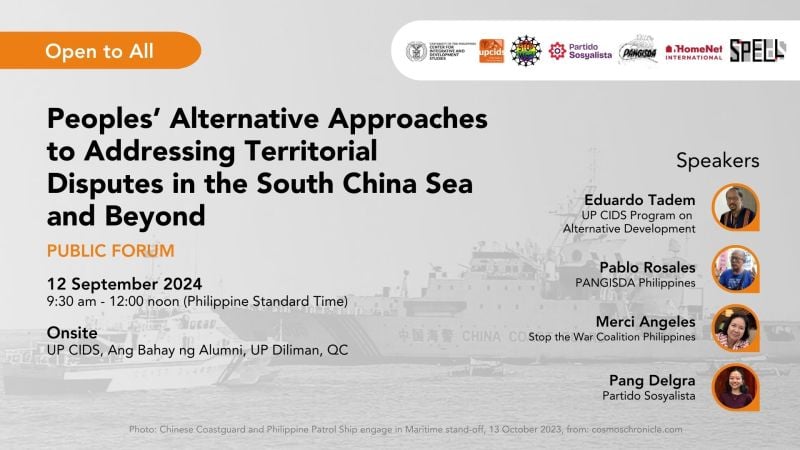Peoples’ Alternative Approaches to Addressing Territorial Disputes in the South China Sea and Beyond: A Public Forum

Everyone is invited to an onsite public forum, “Peoples’ Alternative Approaches to Addressing Territorial Disputes in the South China Sea and Beyond,” on 12 September 2024, 9:30 am – 12 noon, Lower Ground Floor, UP CIDS, Ang Bahay ng Alumni, UP Diliman, Quezon City. The forum is free and open to the public. Seating is first-come, first-served, but participants are requested to pre-register.
ABSTRACT
Conventional approaches to territorial disputes have focused mainly on the issues of nationalism, national identity, sovereignty, territorial integrity and inviolable state boundaries. If pushed aggressively, these result in manifestations of chauvinism, racism and right-wing ultra-nationalism that only serve to heighten conflicts and divide peoples and countries. At the worst, these attitudes could lead to violent conflicts and even all-out wars. In these extreme eventualities, there would be no winners; everyone loses.
These dangers and pitfalls are being played out today in the disputes between several countries in the South China Sea. Particularly evident in the conflict between China and the Philippines, we have seen confrontations between, on the one hand, the Chinese Coast Guard and, on the other, Filipino naval fleets and fisherfolk. Diplomatic protests and the resumption of China-Philippines bilateral talks on July 2, 2024 notwithstanding, tensions remain at a high and dangerous level. At the same time, public and private responses on both sides are being fanned that speak volumes of chauvinist and racist sentiments.
To prevent the further escalation of and to seek a lasting solution to the territorial conflicts in the South China Sea and elsewhere, there is a need to move away from divisive and counterproductive perspectives and policies. While governments go through the motions of lame diplomatic exchanges and bilateral talks that lead nowhere, civil society groups, peoples’ organizations and communities within each of the disputing countries should seize control of the narrative, reach out across borders and national boundaries and collectively work for alternative approaches.
These alternatives should be anchored on the principles of the commons, a shared regional identity, joint development and sharing of resources, people-to-people solidarities, and attention to peoples’ needs. A popular movement from below should mobilize to exert pressure on governments to discard old notions and paradigms and work together for the benefit of all humankind.
SPEAKERS
- Eduardo Tadem
UP CIDS Alternative Development Program
- Pablo Rosales
PANGISDA Pilipinas
- Merci Angeles*
Stop the War Coalition Philippines
- Pang Delgra
Partido Sosyalista
*Replacing Cora Fabros as initially announced
THE ORGANIZERS
For queries, please email: [email protected]
This forum is jointly organized by the ASEAN Civil Society Conference/ASEAN Peoples’ Forum (ACSC/APF) Philippine Process, the University of the Philippines Center for Integrative and Development Studies (UP CIDS), Program on Alternative Development (UPCIDS AltDev), Home Workers Network of Southeast Asia (HomeNet SEA), PANGISDA Pilipinas, the Stop the War Coalition Philippines, and Partido Sosyalista. UP CIDS is the policy research unit of the University of the Philippines, while AltDev is one of its Research Programs. Learn more about AltDev and download their free policy papers.